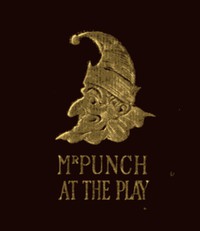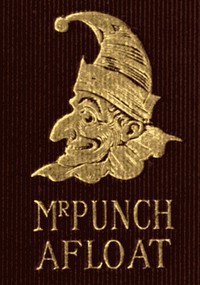Mr. Punch's Country Life: Humours of Our Rustics by J. A. Hammerton (top 100 books to read .TXT) 📗

- Author: J. A. Hammerton
Book online «Mr. Punch's Country Life: Humours of Our Rustics by J. A. Hammerton (top 100 books to read .TXT) 📗». Author J. A. Hammerton
TRANSCRIBER'S NOTE. Some pages of this work have been moved from the original sequence to enable the contents to continue without interruption. The page numbering remains unaltered.
[Cover]
Edited by J. A. Hammerton
Designed to provide in a series of volumes, each complete in itself, the cream of our national humour, contributed by the masters of comic draughtsmanship and the leading wits of the age to "Punch," from its beginning in 1841 to the present day.
MR. PUNCH'S COUNTRY LIFE[Pg 2]
Brown's Country House.—Brown (who takes a friend home to see his new purchase, and strikes a light to show it). "Confound it, the beastly thing's stopped!"
[Pg 3]
MR. PUNCH'S COUNTRY LIFE HUMOURS OF OUR RUSTICS AS PICTURED BYPHIL MAY,
L. RAVEN-HILL,
CHARLES KEENE,
GEORGE DU MAURIER,
BERNARD PARTRIDGE,
GUNNING KING,
LINLEY SAMBOURNE,
G. D. ARMOUR,
C. E. BROCK,
TOM BROWNE,
LEWIS BAUMER,
WILL OWEN,
F. H. TOWNSEND,
G. H. JALLAND,
G. E. STAMPA,
AND OTHERS
WITH 180 ILLUSTRATIONS
PUBLISHED BY ARRANGEMENT WITH THE PROPRIETORS OF "PUNCH"
THE EDUCATIONAL BOOK CO. LTD.
[Pg 4]
The Punch Library of Humour Twenty-five volumes, crown 8vo, 192 pages fully illustratedLIFE IN LONDON
COUNTRY LIFE
IN THE HIGHLANDS
SCOTTISH HUMOUR
IRISH HUMOUR
COCKNEY HUMOUR
IN SOCIETY
AFTER DINNER STORIES
IN BOHEMIA
AT THE PLAY
MR. PUNCH AT HOME
ON THE CONTINONG
RAILWAY BOOK
AT THE SEASIDE
MR. PUNCH AFLOAT
IN THE HUNTING FIELD
MR. PUNCH ON TOUR
WITH ROD AND GUN
MR. PUNCH AWHEEL
BOOK OF SPORTS
GOLF STORIES
IN WIG AND GOWN
ON THE WARPATH
BOOK OF LOVE
WITH THE CHILDREN
[Pg 5]
Than the compilation of such a series of books as that which includes the present volume there could surely be no more engaging occupation for one who delights to look on the humorous side of life. The editor feels that if his readers derive as much enjoyment from the result of his labours as these labours have afforded him he may reasonably congratulate them! He has found himself many times over, as a book has taken shape from his gatherings in the treasure house of Mr. Punch, saying "This is the best of the lot"—and usually he has been right. There is none but is "the best!" There may be one that is not quite so good as the other twenty-four; but wild horses would not drag the name of that one from the editor. He feels, however, that in illustrating the humours of country life Mr. Punch has risen to the very summit of his genius. There is, of course, good reason for this, as it is notorious that the richest humour is to be found in the lowly[Pg 6] walks of life, and flourishes chiefly in rustic places where folks are simple and character has been allowed to grow with something of that individuality we find in the untouched products of Nature. Your true humorist has always been in quick sympathy with the humblest of his fellow men. In the village worthy, in poor blundering Hodge, in the rough but kindly country doctor, the picturesque tramp, the droning country parson, the inept curate, the village glee singers, and such like familiar figures of rural England, the humorist has never failed to find that "source of innocent merriment" he might seek for vainly in more exalted ranks of our complex society. But he seeks among the country folk because his heart is there. The very best of Mr. Punch's humorists of the pencil, Charles Keene and Phil May in the past, and Mr. Raven-Hill and Mr. C. E. Brock to-day, have given more consideration to the country ways of life than to any other, and hence the exceeding richness of the present volume. It is thus in no sense a comic picture of Mr. Punch's notions of how the so-called country life is attempted by the townsman—one of the most notable features of our present social conditions—but is, in effect, a refreshing breath of genuine rustic humour, kindly, whole-hearted, and "racy of the soil."
[Pg 7]
MR. PUNCH'S COUNTRY LIFE THE AGRICULTURAL OUTLOOK (From Dumb-Crambo Junior's Point of View.)The Best Share in a Farm.—The plough-share.
A Proverb Fresh from the Country.—No gooseberry without a thorn.
The Connoisseurs.—Groom. "Whew's Beer do you like best—this 'ere hom'brewed o' Fisk's, or that there ale they gives yer at the White Ho's'?"
Keeper (critically). "Well, o' the tew I prefers this 'ere. That there o' Wum'oods's don't fare to me to taste o' nawthun at all. Now this 'ere dew taste o' the cask!!"
[Pg 8]
THE LANGUAGE OF FRUITS apple Discord. Pear Marriage. Plum Wealth. Pine Languishment. Gooseberry Simplicity. Medlar Interference. Service Assistance. Elder-berry Seniority. Fig Defiance. Sloe Tardiness. Crab Sour Temper. Date Chronology. Hip Applause. Haw Swells. Plaintain Growth. Pomegranate Seediness. Prune Retrenchment.The Real Land Question.—How to make land answer.
Perfect Quiet.—The still room.
[Pg 9]
Land and Water.—Prospective Purchaser (arrived from town to see the locality as advertised some three weeks ago. He has not heard of the recent floods in this part of the country). "Look here. Are you selling this property by the yard or by the pint?"
[Pg 10]
A Country Sell.—Native Joker (dissembling). It's been very fine here for the last week.
Tourist (who has been kept in by the showers, indignantly). What's been very fine here?
Native. The rain. Very fine rain.
[Exit Native Joker, hurriedly.
"The Best of It."—First Gentleman Farmer. "Why, there goes that artful rogue, Billy Giles! Is he at his old tricks still?"
Second Ditto. "He has cheated everybody down about here, sir, except me! He tried it on this winter, but I was too clever for him! Sold me a cow, and—(triumphantly)—I made him take it back at half-price!!"
The Real "Land Agitation."—An earthquake.
A CRY FROM KENT.
Prosperity's fled from our gardens and grounds;
How spindly our bines and how scanty our crops!
Wealth may be "advancing by leaps and by bounds,"
It certainly isn't by hops!
Advice to Farmers.—Feed your poultry well, and you will insure full crops.
[Pg 11]
First Tramp (to second ditto). "That's a stylish sort of dawg you're a-wearin'!"
[Pg 12]
Curate (who wishes to encourage local industry). "Well, Adams, how are you getting on with my watch?"
Adams. "Why, it be nigh finished now, zur, an' 'e do zeem to go mortal well, but dang me, if there bain't a wheel as I can't find a place vor summow!"
"I'm sorry to hear you've been ailing again, John. I must send you down something from the Rectory. How would you like some soup?"
"Thanky kindly, mum—but I bain't so terr'ble wrapped up in soup!"
What Rural Deans Smoke.—"Church-wardens."
[Pg 13]
Convivial Party. "I shay, ole f'ller, how long doesh it take to gerout of thish wood?"
[Pg 14]
Doctor. "Well, you got those leeches I sent for your husband, Mrs. Giles?"
Mrs. Giles. "Yes, zur; but what on earth be the good o' sending they little things vor a girt big chap like he? I jes' took an' clapped a ferret on 'un!"
Note by a Chiropodist (in the country for the first time).—"Must be very painful—corn in the ear."
A Pastoral.—How should a shepherd arrange his dress? In folds.
The Dunmow Flitch.—All gammon.
[Pg 15]
Hotel-keeper (who has let his "Assembly Room" for a concert). "Well, sir, I 'ope you found the arrangements in the 'all satisfactory last night?"
Mr. Bawlington. "Oh, yes; everything was all right. There was only one thing to object to. I found the acoustics of the building not quite——"
Hotel-keeper. "No, sir; excuse me. What you smelt was the stables next door!"
[Pg 16]
Giles. "I be got up here, mister, but I don't zee 'ow ever I be goin' to get down."
Farmer. "Thee zhut thee eyes an' walk about a bit, an' thee'll zoon get down!"
An Old Offender.—Country Gentleman (eyeing his Gardener suspiciously). "Dear, dear me, Jeffries, this is too bad! After what I said to you yesterday, I didn't think to find you——"
Gardener. "You can't shay—(hic)—I wash drunk yesht'day, sh——!"
Country Gentleman (sternly). "Are you sober this morning, sir?"
Gardener. "I'm—shlightly shober, shir!!"
[Pg 17]
Qualified Admiration.—Country Vicar. "Well, John, what do you think of London?" Yokel. "Lor' bless yer, sir, it'll be a fine place when it's finished!"
[Pg 18]
Squire's Daughter. "Do you think it is quite healthy to keep your pigs so close to the cottage?"
Hodge. "I dunno, miss. Noan of they pigs ain't ever been ill!"
[Pg 19]
Farmer's Wife (whose beer is of the smallest). "Why, you hevn't drunk half of it, Mas'r Gearge!"
Peasant (politely). "Thanky', mu'm—all the same, mu'm. But I bean't so thusty as I thought I wor, mu'm!!"
[Pg 20]
Nephew (on a visit to the "Old Country"). "Ah, uncle, in Canada we don't do our hay-makin' in this 'ere old-fashioned way."
Uncle. "Why, you bean't never goin' to tell I as you've bin an' turned teetotal?"
Reciprocity.—Parson. "I have missed you from your pew of late, Mr. Stubbings——"
Farmer (apologetically). "Well, sir, I hev' been to meet'n' lately, but—y' see, sir, the Reverend Mr. Scowles o' the chapel, he bought some pigs o' me, and I thought I ought to gi' 'm a tarn!"
The Farmer for the Fair.—A husbandman.
[Pg 21]
Doctor. "Well, Mrs. Muggeridge, how are you getting on? Taken the medicine, eh?" Mrs. M. "Yes, doctor. I've taken all the tabloids you sent, and now I want a new persecution."
[Pg 22]
On a Footing.—Almost every considerable town has a market for corn; therefore, it is but fit that Bedford Market-place should have its Bunyan.
Place of Residence for Lodgers.—Border-land.
Soundings!—(The living down at our village falling vacant, Lord Pavondale left it to the parish to choose the new rector.)
Influential Parishioner. "Then am I to understand, Mr. Maniple, that you object to bury a Dissenter?"
The Rev. Mr. Maniple (one of the competitors). "Oh, dear me, no, Mr. Jinks; quite the contrary!"
A High Church Party.—A steeple-jack.
A Clerical Error.—A long sermon.
Visitor. "My good man, you keep your pigs much too near the house."
Cottager. "That's just what the doctor said, mum. But I don't see how it's agoin' to hurt 'em!"
[Pg 23]
[Pg 24]
A WET DIARYJanuary.—Buy a house in the Midland Counties. Put a housekeeper in it to look after it.
February.—Housekeeper writes to say that, owing to the floods, the neighbourhood is very damp and unhealthy.
March.—Housekeeper writes to say that the garden is under water.
April.—Housekeeper writes to say that there is





Comments (0)